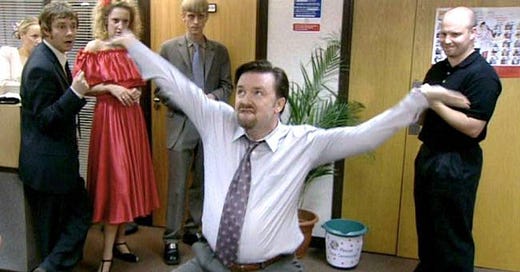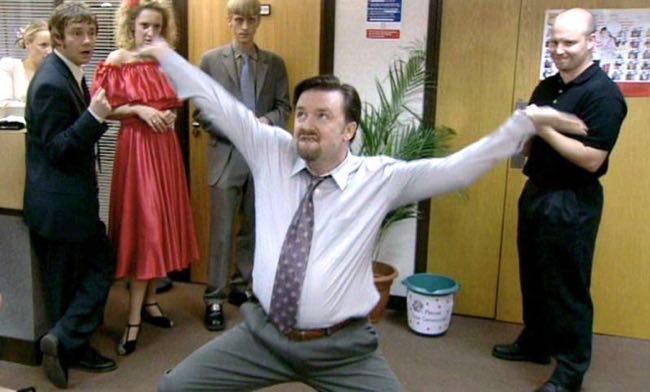Why office work is such a doss
Up until the First World War in most developed countries, farmworker was the most common job, followed by live-in servant. The pay was poor, the hours were long, and the work was backbreaking and often dangerous.
Things changed at the turn of the 20th century as farms adopted mechanisation and new jobs were created by the Industrial Revolution in fields such as steel-making, textiles and shipbuilding. All of which shifted workers out of farming.

Farmers and servants flocked into big industrial cities for an opportunity which meant slightly more pay, unfortunately, the living conditions were probably worse and the hours were still exhaustingly long.
The changing workplace
Over the last 100 years or so, working conditions have improved significantly. From young children working as coal miners, rat catchers and bird scarers (human scarecrows) to the current day of sitting in a comfortable office or working from home.
Industrial/blue-collar work has been in decline for some time with knowledge work becoming the new dominant sector. It was Peter Drucker in his book Landmarks of Tomorrow where the term knowledge worker was first coined and has stuck since.
A knowledge worker is someone who thinks for a living, a far cry from working as a mule scavenger in the cotton mills. Knowledge workers include programmers, doctors, architects, engineers, scientists, accountants, lawyers, and most people that work in an office. And it's the office cohort where work has become the least challenging.
From coal mines to Reddit
First off, not everyone with an office job is spending their time idly. But I'm sure it's the majority. The way I see it, office workers fit into four categories:
Those with little to do and don't hide it
Those with little to do but pretend they're busy
Those busy but with meaningless tasks (company productivity isn't affected by their busyness)
Those busy with real stuff that makes a difference
It's not possible to know how many fall into each category other than estimating through your own experience. However, the Pareto principle will certainly be in effect with only a small minority whose work makes a difference.
Certainly, my 20+ office years tell me that the majority of people don't have much do to, and where else to validate this hypothesis than Reddit.
Not having enough to do in the office is a classic case of the emperor has no clothes, no one will talk about it, but anonymous forums give us a small peek behind the scenes. Just like this post started by LastTrainLongGone and some of the follow-up comments:
I wonder what I'm doing with my life, browse Reddit, listen to music while trying to stay awake. Except when I have a deadline - then I work.
If I got 4 emails a day I would feel rushed!
I'm in the office for 9 hours and only do 2 hours of actual work maximum.
For about 10 years now. Working from home. Get paid for doing nothing. Join conference calls once a week in Texas to talk about "the numbers". Numbers over which we have no control.
I probably spend a quarter of my workday on Reddit. I'll have a fancy spreadsheet open, with a few post-it notes on the monitor to look busy, but on my small screen, I'll browse Reddit; plus I'm in the corner of the office so there's no one behind me and I can switch windows pretty fast now when someone approaches me.
In my work I go into a lot of workplaces, I can confirm that most places are like this. I found the same 20 years ago when I was temping. People are just naturally inefficient. Apart from manual, repetitive tasks (which a machine should be doing really) you just can't get 8+ hours solid work out of people.
Honestly, after the initial fun of dossing around, it's completely shite. Constantly feeling useless/like a trained monkey could do your job eats away at your self-esteem like nothing else. I feel like a fraud for doing the work I have too quickly. I feel simultaneously overpaid and under-utilised but can't say anything because I need the job.
Moving on from Reddit, it's fair to say, no investigation into the absurdity of office life would be complete without seeing what my and many others' mentor on the topic has to say.
Dilbert
"If I had to describe my 16 years of corporate work with one phrase, it would be 'pretending to add value.' … The key to career advancement is appearing valuable despite all hard evidence to the contrary. … If you add any actual value to your company today, your career is probably not moving in the right direction. Real work is for people at the bottom who plan to stay there."
Scott Adams (creator of Dilbert)
As the creator of Dilbert puts it, the reality for many is that office work is a pretence, it's about making yourself look good, or how I often hear it described: it's a game.
Why office work is a charade
Not that long ago two-thirds of us were working on a farm or in the factory. It was clear what work was and it was quantifiable. Our bosses could see how much of the field we'd ploughed or how many shoes we'd cobbled. Work was directly related to production. Now we're in a world of autonomous knowledge work where output isn't tangible like a physical good or service.
This unaccountability hasn't gone unnoticed, businesses want to know how to measure their staff vs the bogus targets and measures often put in place. One study looked at 800 academic research papers to try and understand how to measure knowledge workers. The conclusion was "Knowledge Work is so varied and its outputs so intangible that it is not possible".
The unaccountable nature of office work is one piece of the puzzle, the other is Parkinson's Law, which tells us "work expands so as to fill the time available for its completion".
This law only applies in the bureaucratic office realm, a brick wall takes a fixed amount of time to build (give or take), whereas, a meeting will last as long as the time allotted, a PowerPoint deck will take as long or short as the time permitted.
This phenomenon creates a lot of unnecessary job roles, Cyril Northcote Parkinson observed the number of people employed in a bureaucracy rose between 5–7% annually, irrespective of any variation in the amount of work (if any) that needed to be done.
For those that like to be busy, Parkinson's Law is a blessing but others would rather loaf than fill their days with tasks and meetings that don't contribute towards anything useful.
Not being busy should be encouraged
Not slacking when tables need serving, I get. But when your work is an abstract concept with no relationship towards production, then loafing shouldn't be frowned upon. In fact, it should be encouraged.
There are too many people that feel the urge to create work when no real work exists. This has the consequence of causing distractions for those that do the real work and annoy everyone else.
Cut the working week
Why do we work 8 hours a day? Statisticians weren't involved in crunching the numbers to calculate the optimum number of productive hours. It was guesswork, a stab in the dark.
The idea came about before office and certainly knowledge work was a thing. The slogan "Eight hours labour, eight hours recreation, eight hours rest" was coined by Robert Owen in 1817, a Welsh mill owner and labour rights activist.
Working 40 hours a week has its roots from industrial society and not one of offices, computers and knowledge work. Annual working hours have been in decline since records began and need to decline further to support the change in times.

If 8 hours was long enough when most people worked in a factory and effort was directly related to the production of goods, then today where output is so intangible that it can't be measured, surely 5 hours is long enough.
Some may say, reduce unnecessary jobs instead. But that would be catastrophic. It's no exaggeration to state: the global economy would collapse if all the unproductive jobs were removed (37% by a loose estimate).
As David Graeber (author of Bullshit Jobs) puts it "Capitalism creates unnecessary jobs in order for the wheels to merely keep on turning" (a variation on what Cyril Parkinson told us).
Instead, we should cut the working day in half, which gets rid of loafing and most of the pointless office activities. The excessively long working day is the reason for so many pointless meetings, cut it in half and everyone is forced to focus on what matters.
It was the forward-thinking Henry Ford in 1926 that changed the working week from 6 days to 5 and then others followed suit. We need another contrarian thinking business leader that will advocate for less is more so that office work can become more bearable and who knows maybe more productive.







